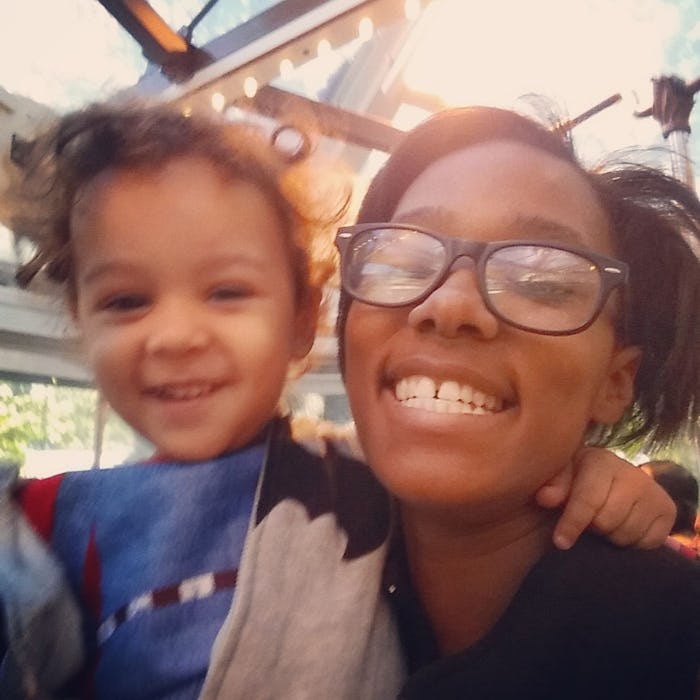Life

I'm A Millennial Mom, & I'm Sick Of Being Shamed…
When I found out I was pregnant, I told myself that I wasn't going to be like my parents. Not because they were bad parents, but because I was determined to be different from them.
My parents were always very authoritarian. They ruled with a “what I say goes“ kind of mentality, and I always felt hesitant to express my true feelings to them. I knew that I didn't want my kid to ever feel like he couldn’t tell me about his feelings, and I knew that I wanted to take a gentle yet firm approach to discipline. It was important to me that he have space to be a kid. I knew it was totally normal for him to make noise and throw tantrums, and I would never feel comfortable punishing him for age-appropriate behavior.
Of course, my own parents think my parenting style is ludicrous, but that's not so surprising. As a millennial mom, I'm used to being shamed for my parenting style or accused of "coddling" my kids — even though in many ways, I think I'm doing a better job than previous generations.
Millennial moms are one of the fastest-growing demographics out there. Currently, millennials account for nearly 90% of all new mothers, as well as 1 in 5 mothers in total. With so many of us out there, we're beginning to form our own style of parenting, and it's a direct response to the parenting style of the generation before us, which was much more focused on discipline and establishing control. Even though this is ostensibly a good thing, there's nonetheless a stereotype that millennial moms are overly permissive, and that we're raising a generation of "entitled," spoiled kids.
When my son was an infant, I started to join groups on Facebook, which were mainly focused on breastfeeding. Through these groups, I learned about two millennial mom parenting trends: attachment parenting and gentle parenting, which advocate for moms fostering close bonds with their children and using a positive, not disciplinarian, approach to discouraging bad behavior. While they didn’t line up 100% with my own parenting goals, they were close to what I was aiming for in parenting my own son, and it was helpful to use them as reference points.
My conservative parents laughed at my more hands-on approach to parenting. Whenever I nursed my son for comfort or cuddled him when he was upset, they would comment that I was “spoiling” him.
My conservative parents laughed at my more hands-on approach to parenting. Whenever I nursed my son for comfort or cuddled him when he was upset, they would comment that I was “spoiling” him, even though I felt like I was simply being emotionally present with him in a way that they weren't with me. My father loves to scoff at my parenting choices and refer to me derisively as a “millennial” to his friends. My mom sees the way I parent my son as a personal affront to the way she raised me.
Although I'm fairly hands-on emotionally, I generally give my son space to figure out how he wants to navigate his day. When he was about 18 months old, I started working as a babysitter, so I brought him with me to all of my jobs. When I scaled back my hours and we had more time to hang out together, I started asking him what he wanted to do with his day. If I suggest going to the playground and he is more interested in staying at home playing with his toys, 9 times out of 10 we'll stay home.
I don't consider this indulging him or giving into his impulses. The stress of forcing my son to do something he doesn't want to do is rarely worth it. Still, my parents don't understand why I give him so many choices.
My parents also take issue with how I discipline my child. I have an incredibly strong-willed kid, and discipline has always been a learning curve for us. I've always known that I didn't want to use physical force with him (though I will say I have used it on occasion to get my point across). Instead, I'll usually give him a timeout. I am much more inclined to react positively to his good behavior than to constantly dwell on his negative actions, because he's very smart and knows when his behavior is inappropriate.
When I constantly yell at my son, it's exhausting for both of us and it doesn't really change anything about his behavior. But when I reward him for doing something good, he is more inclined to repeat the behavior.
My parents think I should be more strict with my son. But when I constantly yell at him, it's exhausting for both of us and it doesn't really change anything about his behavior. But when I reward him for doing something good, he is more inclined to repeat the behavior, even if that reward is as simple as a "thank you." Occasionally, I'll buy him a toy if he's being good, but I have found that just giving him affection and telling him how good he is also works just as well.
I by no means have any of this parenting stuff figured out, but I do feel like I'm beginning to learn what works best for me and my kid. I think if there's one thing that truly differentiates millennials from the previous generation, it's a willingness to adapt the parenting methods that already exist to better suit your needs. If that flexibility means my kid will grow up spoiled and “entitled,” then so be it. I'd rather raise a kid who is confident and secure in himself than rule over him with an iron fist.